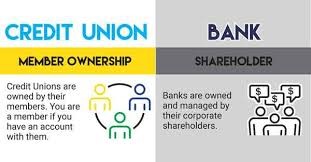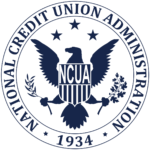One of the essential decisions that the average American should make in 2024 is to protect their financial assets and join a credit union.
Credit unions are member-owned non-profits that are locally focused and offer many of the same services that large national banks provide. Because they are non-profits, they share any profits among their member-depositors.
Credit unions are not publicly traded, and because of their non-profit structure, they offer members lower rates than for-profit banks. They have fewer physical branches to keep costs down and rely more on ATMs locally and nationwide. Since they are not publicly traded, credit unions only have to make enough money to continue daily operations. 
While they are not as well publicized as other massive, global financial and investment institutions, credit unions are designed for average citizens and focus on their essential individual and business investment needs, unlike multinational banks.
Global banks make a large percentage of profits from trading, making international finance deals, mergers and acquisitions, and financial engineering deals that have nothing to do with advancing the financial needs of average Americans.
Today, about 5,000 credit unions operate in every state and many large metropolitan areas. Various sources rank credit unions in terms of their scope of services and competitive rates, so check to see which is right for you. Click here to see a complete list of credit unions nationally.
Membership in Credit Unions
While credit unions often have titles from a partnership or professional group, many are open to anyone. For instance, BECU (the Boeing Employees Credit Union, one of the largest in the US) is open to anyone.
To open an account at a credit union, you must first open an account, often for a nominal amount. When you do, you become a member and a partial owner. However, unlike publicly traded banks, where voting depends on how many shares you own, everyone in a credit union has one vote in determining the board of directors and other actions that affect the credit union. 
According to the National Credit Union Association (NCUA), about 122 million Americans will be credit union members in 2022. The NCUA is federally insured, similar to the Federal Deposit Insurance Corporation (FDIC), which governs for-profit banks.
Credit Unions are Scandal Free
By design, credit unions are more aligned with their members. This is the opposite of for-profit, global banks that pursue profits to generate more income quarterly for their shareholders.
Most importantly, credit unions have avoided the scandals and huge fines levied against national banks by federal and state regulators because they do not have to meet quarterly financial goals for their investors. This is why significant banks, such as Chase, Wells Fargo, and Citibank, make headlines for the huge fines levied against them. Worse, fines were imposed because the central banks were victimizing their customers.
Here are the fines made by federal regulators against US banks in 2022 by the Biden administration:
The institutions that were hit with the most significant penalties are as follows:
- Bank of America: $225 million
- Citigroup: $200 million
- Goldman Sachs: $200 million
- Morgan Stanley: $200 million
- Credit Suisse: $200 million
- Barclays: $200 million
- Deutsche Bank: $200 million
- Nomura: $100 million
Consider These Fines on Financial Crimes
Many major banks that have been the subject of huge fines from regulators are repeat offenders. Their DNA prevents them from acting in the best interests of individual customers because they do not generate profits from investment banks, trading, deal-making, bond activities, IPOs, and the like.
That’s why this short list of fines shows the lengths global banks will go to to meet corporate profitability benchmarks, including victimizing their customers.
- In 2022, Wells Fargo’s years-long mistreatment of its customers resulted in another record-breaking fine and a warning that more restrictions on its ability to do business could soon follow.
In December 2022, “the bank agreed to pay $1.7 billion in penalties and another $2 billion in damages to settle claims that it engaged in an array of banking violations over the last decade that harmed millions of consumers, the Consumer Financial Protection Bureau said, according to the New York Times.
Wells Fargo is a repeat offender. In 2016, Wells Fargo admitted to selling insurance policies to unsuspecting customers, forcing the bank to pay $185 million in fines. The policies were “sold predominantly to individuals with Hispanic-sounding last names concentrated in Southern California, southern Texas, southern Arizona, and southern Florida,” the lawsuit states. According to the bank’s disclosures, those four states also accounted for most of the sham accounts created by Wells Fargo’s employees.
- In 2011, Citigroup Inc. and Deutsche Bank deceived credit unions about the dangers of buying risky credit derivatives tied to subprime mortgages. After the banks were convicted, they agreed to pay $165.5 million to settle federal regulators’ claims that they misled five failed credit unions about the risk of mortgage securities.
Citigroup will pay $20.5 million, and Deutsche Bank will pay $145 million. Neither admit nor deny wrongdoing.
- In 2021, the SEC and CFTC fined JPMorgan Chase $200 million last year for various financial violations.
Rage Against the Machine: Join a Credit Union in 2023
Suppose you are an individual consumer or small business owner. In that case, you can do a minimum of research and find that credit unions’ goals and business operations align better with yours. If you have an account with a significant nationwide bank that has paid millions in fines over the last decade, it’s clear their interests do not favor individuals. So, make the break and join a credit union.











